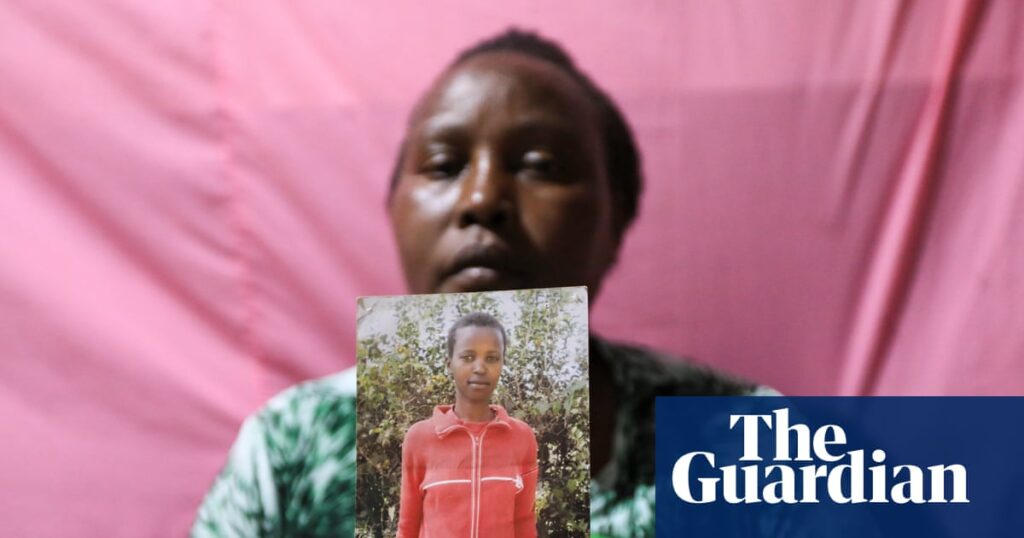In the spring of 2012, David Cameron was prime minister and British troops were still fighting in Afghanistan under the stewardship of the then defence secretary, Philip Hammond.
Before deploying, soldiers from the UK would be flown 3,000 miles south-west of Helmand province, to Kenya, for hot weather training. They would train at Batuk, the British army base that still operates today, close to Nanyuki, a poor market town in the east of the country.
In a town that struggles with poverty, unemployment and limited economic opportunities, many women in Nanyuki would turn to selling sex for money – British soldiers being a lucrative source of trade.
Agnes Wanjiru, a 21-year-old hairdresser and mother to a five-month-old baby, was among them. On the night she disappeared, in late March 2012, she was last seen in the bar of the Lion’s Court hotel, a popular haunt with British soldiers, where she had been drinking with two friends, Florence Nyaguthii and Susan Nyambura.
The next morning, when Agnes failed to return home, her family and friends began looking for her. They spent weeks searching, until, about two months later, Agnes’s body was found in a septic tank in the grounds of the hotel.
In the years since then, her disappearance has been the subject of a number of criminal investigations and inquests, Agnes’s family campaigning to get answers while caring for Stacey, the daughter she left behind.
Over the course of 13 and a half years, the campaign was spearheaded by her niece Esther Njoki and sister Rose Wanyua Wanjiku, who saw power pass between six prime ministers and seven defence secretaries in the UK, and three presidents in Kenya, before they saw any progress.
Their campaign was cast into the international spotlight, and was given added momentum, when the Sunday Times, almost four years ago to the day, began reporting on Agnes’s case.
Serving and former soldiers who were in Kenya at the time Agnes disappeared spoke out, with several coming forward to name a suspect in the case.
It put renewed pressure on the governments of both countries, amid anger and protests in Kenya over Britain’s continued military presence in the region. Separately, the renewed interest in the case also resulted in a fresh police investigation, led by Kenyan detectives, with the support of the UK’s royal military police.
With jurisdiction in the case resting with Kenya, detectives flew out from Nairobi to the UK to question suspects and witnesses, many of them British soldiers.
After almost a decade and a half with no arrests, no court appearances, and no convictions, it seemed unlikely that there would ever be a breakthrough in the case.
Yet on Tuesday, the high court in Nairobi issued an arrest warrant for Robert James Purkiss, a former British soldier, originally from Greater Manchester.
It is only an arrest warrant, with the charges set before the Kenyan court not proven. Purkiss would need to be extradited in order to face those charges.
It means the Kenyan government will first need to submit an extradition request to the UK Home Office, which will need to be certified by the home secretary, Shabana Mahmood, and sent to the courts, with extradition cases normally heard at Westminster magistrates court.
For a suspect to be extradited, the court must be satisfied there are reasonable grounds for believing the conduct described is an extradition offence, and only then will a warrant be issued in the UK and a suspect arrested.
A date would then be set for an extradition hearing in front of British judge, which Purkiss would have the opportunity to contest, before the separate criminal proceedings could take place in Kenya. The case is next set to be mentioned at court in Nairobi on 21 October.
If Purkiss is successfully extradited to face trial in Kenya, the criminal proceedings would look different to those in the UK; the jury system was abolished in Kenya at the end of colonial rule.
Similar to in a UK criminal case, a defendant has the opportunity to plead guilty or not guilty, and if a case goes to trial, the prosecution and defence will set out their respective cases, with the opportunity to cross-examine each other’s witnesses.
However, it is the presiding judge who makes a decision in a case, rather than a citizen jury, with legal expert assessors, who assist the judge in determining facts, used in some cases, particularly more serious trials.
Neither the Home Office nor the Ministry of Defence has disclosed whether a request for extradition has yet been submitted by the Kenyan government.
“Our thoughts remain with the family of Agnes Wanjiru and we remain absolutely committed to helping them secure justice,” a UK government spokesperson said.
“We understand that the Kenyan director of public prosecutions has determined that a British national should face trial in relation to the murder of Ms Wanjiru in 2012.
“This is subject to ongoing legal proceedings and we will not comment further at this stage.”

